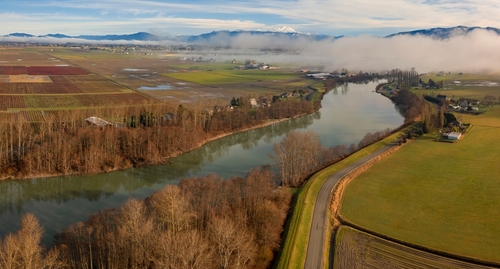Seattle settles case involving 'rights of nature,' a theory gaining steam in other countries

An aerial drone view of the Skagit River in Washington. Image from Shutterstock.
Last month, the city of Seattle settled a “rights of nature” case pending in the Sauk-Suiattle Tribal Court of Appeals that was filed on behalf of salmon harmed by dams on the Skagit River.
Seattle agreed to include in its federal renewal application to operate hydroelectric dams a commitment to operate fish-passage facilities, according to a May 2 press release by the Center for Democratic and Environmental Rights.
The case was one of the first rights of nature cases filed in the United States, the New York Times reports.
The movement is having more success in other countries.
“Countries like Ecuador, New Zealand and Uganda have laws granting natural objects rights,” the New York Times reports. “And court rulings in India, Colombia and Bangladesh have recognized them too.”
Other cases in the United States haven’t fared as well.
A Lake Erie Bill of Rights adopted by Toledo, Ohio, in 2019 was intended to protect the lake from pollution, according to a May 4, 2020, press release from the Animal Legal Defense Fund. The law gave Lake Erie legal standing and gave Toledo, Ohio, and its residents the right to sue on the lake’s behalf.
A federal judge overturned the measure in 2020 for being unconstitutionally vague, Salon reported last year.
In another case, a federal judge dismissed a 2017 lawsuit filed on behalf the Colorado River Ecosystem and its right “to exist, flourish, regenerate and naturally evolve.”
The case was tossed after the plaintiffs withdrew it, citing “a heightened ethical duty” to ensure that conditions are appropriate for courts to best consider the merits of the legal theory, Courthouse News Service reported in December 2017.
The rights of nature idea was proposed in a 1972 law review article by Christopher D. Stone, a professor at the University of Southern California, who died in 2021.
“I am quite seriously proposing that we give legal rights to forests, oceans, rivers and other so-called ‘natural objects’ in the environment—indeed, to the natural environment as a whole,” Stone wrote.
“It is no answer to say that streams and forests cannot have standing because streams and forests cannot speak. Corporations cannot speak either; nor can states, estates, infants, incompetents, muncipalities or universities. Lawyers speak for them,” Stone wrote.



